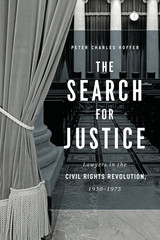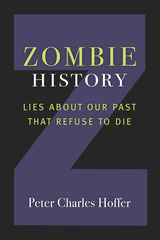2 books about Hoffer, Peter Charles

The Search for Justice
Lawyers in the Civil Rights Revolution, 1950–1975
Peter Charles Hoffer
University of Chicago Press, 2019
The civil rights era was a time of pervasive change in American political and social life. Among the decisive forces driving change were lawyers, who wielded the power of law to resolve competing concepts of order and equality and, in the end, to hold out the promise of a new and better nation.
The Search for Justice is a look the role of the lawyers throughout the period, focusing on one of the central issues of the time: school segregation. The most notable participants to address this issue were the public interest lawyers of the NAACP’s Legal Defense Fund, whose counselors brought lawsuits and carried out appeals in state and federal courts over the course of twenty years. But also playing a part in the story were members of the bar who defended Jim Crow laws explicitly or implicitly and, in some cases, also served in state or federal government; lawyers who sat on state and federal benches and heard civil rights cases; and, finally, law professors who analyzed the reasoning of the courts in classrooms and public forums removed from the fray. With rich, copiously researched detail, Hoffer takes readers through the interactions of these groups, setting their activities not only in the context of the civil rights movement but also of their full political and legal legacies, including the growth of corporate private legal practice after World War II and the expansion of the role of law professors in public discourse, particularly with the New Deal. Seeing the civil rights era through the lens of law enables us to understand for the first time the many ways in which lawyers affected the course and outcome of the movement.
The Search for Justice is a look the role of the lawyers throughout the period, focusing on one of the central issues of the time: school segregation. The most notable participants to address this issue were the public interest lawyers of the NAACP’s Legal Defense Fund, whose counselors brought lawsuits and carried out appeals in state and federal courts over the course of twenty years. But also playing a part in the story were members of the bar who defended Jim Crow laws explicitly or implicitly and, in some cases, also served in state or federal government; lawyers who sat on state and federal benches and heard civil rights cases; and, finally, law professors who analyzed the reasoning of the courts in classrooms and public forums removed from the fray. With rich, copiously researched detail, Hoffer takes readers through the interactions of these groups, setting their activities not only in the context of the civil rights movement but also of their full political and legal legacies, including the growth of corporate private legal practice after World War II and the expansion of the role of law professors in public discourse, particularly with the New Deal. Seeing the civil rights era through the lens of law enables us to understand for the first time the many ways in which lawyers affected the course and outcome of the movement.
[more]

Zombie History
Lies About Our Past that Refuse to Die
Peter Charles Hoffer
University of Michigan Press, 2020
Fake history is not a harmless mistake of fact or interpretation. It is a mistake that conceals prejudice; a mistake that discriminates against certain kinds of people; a mistake held despite a preponderance of evidence; a mistake that harms us. Fake history is like the Zombies we see in mass media, for the fake fact, like the fictional Zombie, lives by turning real events and people into monstrous perversions of fact and interpretation. Its pervasiveness reveals that prejudice remains its chief appeal to those who believe it. Its effect is insidious, because we cannot or will not destroy those mischievous lies. Zombie history is almost impossible to kill. Some Zombie history was and is political, a genre of what Hannah Arendt called “organizational lying” about the past. Its makers designed the Zombie to create a basis in the false past for particular discriminatory policies. Other history Zombies are cultural. They encapsulate and empower prejudice and stereotyping. Still other popular history Zombies do not look disfigured, but like Zombies walk among us without our realizing how devastating their impact can be. Zombie History argues that, whatever their purpose, whatever the venue in which they appear, history Zombies undermine the very foundations of disinterested study of the past.
[more]
READERS
Browse our collection.
PUBLISHERS
See BiblioVault's publisher services.
STUDENT SERVICES
Files for college accessibility offices.
UChicago Accessibility Resources
home | accessibility | search | about | contact us
BiblioVault ® 2001 - 2024
The University of Chicago Press









